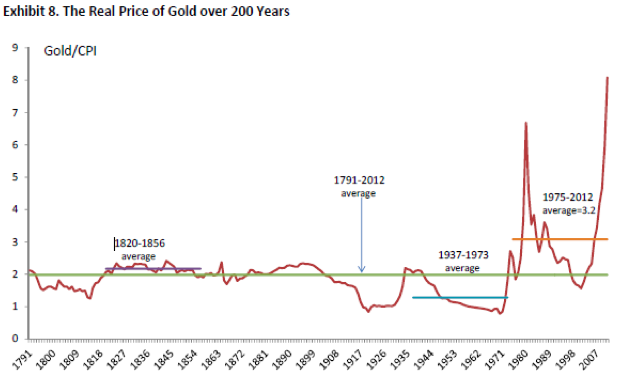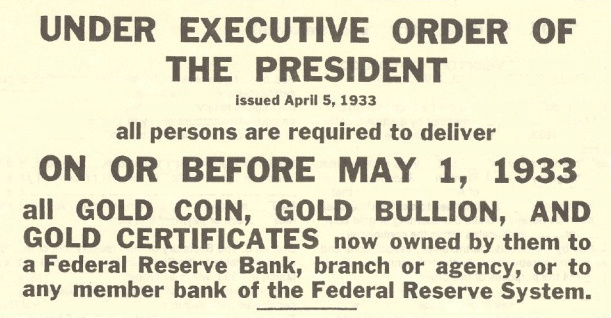Personal Finance
Bitten By the Gold Bug
Time to Buy, or Sell?
Gold in Ancient Rome and Today Is Gold A Currency Hedge?
Then Why Buy Gold?
Central Bank Insurance
How to Buy Gold
Scandinavia, Europe, and Toronto Oh, and the Mayan Calendar
By John Mauldin | December 17, 2012
“For every complex problem there is an answer that is clear, simple and wrong.” – H. L. Mencken
Possibly, the question I am asked the most is, “What do you think about gold?” While I have written brief bits about the yellow metal, I cannot remember the last time I devoted a full e- letter to the subject of gold. Long-time readers know that I am a steady buyer of gold, but to my mind that is different from being bullish on gold. In this week’s letter we will look at some recent research on gold and try to separate some of the myths surrounding gold from the rationale as to why you might want to own some of the “barbarous relic,” as Keynes called it. My personal reasons for owning gold have evolved over the years. I will tell you the story of my own journey, and you can decide for yourself whether to think about coming along.
I cannot start this letter, however, without a brief but sad note about the tragic events at Newton. As a parent I cannot imagine the anguish and horror at learning that my child was murdered while sitting in her first-grade classroom. The senseless wasting of so many young lives leaves me profoundly saddened for our country and culture. There is not much that I can say other than to extend my deepest sympathies to the families and friends of the victims – and perhaps to wonder about the wisdom of relegating violence to the level of an arcade game in the movies and games our kids watch and play.
Bitten By the Gold Bug
I wandered as an innocent bystander into the world of investment newsletter publishing in 1981-82. Back then it was a world inhabited to a great extent by “gold bugs” of one variety or another. The investment newsletter world was in its infancy, and I was something of a direct- mail wizard, brought in to weave my magic with mailing lists and fluid copy. You can’t write……
…..read the rest of this exhaustive analysis HERE (13 pages). At least read “Time to Buy or Sell” on page 3.


 The one resounding thing that emerged from this world tour and holding conferences in US, Asia, and Europe, was that there is a universal rising tide that realizes something is seriously wrong. In having our computer forecast every market around the world, the benefit was that the analysis is the same, without emotion, and void of human opinion. You just cannot forecast anything any more in isolation. The year 2013 came up in just about every market from Asia to Europe as a profound turning point on a global scale. There is nothing that could cause such a unified correlation but the Sovereign Debt Crisis. Governments are desperate for cash and beware. Anyone who thinks buying gold is the answer, realize one thing. Sales are recorded so many ways so it would not be hard for government to figure out who has gold and who does not. It is not just so easy. They know everything about everyone. Privacy no longer exists.
The one resounding thing that emerged from this world tour and holding conferences in US, Asia, and Europe, was that there is a universal rising tide that realizes something is seriously wrong. In having our computer forecast every market around the world, the benefit was that the analysis is the same, without emotion, and void of human opinion. You just cannot forecast anything any more in isolation. The year 2013 came up in just about every market from Asia to Europe as a profound turning point on a global scale. There is nothing that could cause such a unified correlation but the Sovereign Debt Crisis. Governments are desperate for cash and beware. Anyone who thinks buying gold is the answer, realize one thing. Sales are recorded so many ways so it would not be hard for government to figure out who has gold and who does not. It is not just so easy. They know everything about everyone. Privacy no longer exists.
Governments everywhere are desperate for cash. The German socialists have blocked a tax deal with Switzerland because they want to know who has accounts there. It is no longer good enough for Switzerland to collect the tax and hand it in bulk form while protecting the names of individuals that was has been their law created back in 1934 when Hitler demanded the same information and was hunting the assets of any German outside the country. We are following the same policies as Hitler invoked. Anyone with an account out the country is a criminal. This has become about retribution – not just money. The hatred is just oozing out of every socialistic crack.
German Senate blocks divisive Swiss tax deal
The US Presidential elections were the nastiest perhaps in history with Obama practically spitting at any household that earns $250,000 or more and Joe Biden calling these people the “Super Rich”. These are the same rantings of those who followed Lenin and Mao. It is all about retribution. They say whatever they need to say to win even if they do not believe the bullshit they are saying. But the problem emerging is they are stirring the masses who are devolving into class hatred that can only lead to class warfare. When you cut a tree, in which direction it falls depends on the angle of the cut. If you just cut it straight with no angle, then the decision may be just the wind. Life as we know it is being tested. Can we avoid the hatred and civil unrest that this bullshit is stirring up or must we sink into squallier?.
Because of the seriousness of what we face and the number of people asking for a conference not on trading, but just of surviving, we will try to arrange a conference in Philadelphia for the general public one day with a seat price of just $200 as a public service. Those interested should reserve a space so we can determine how big a room to provide. The date will be in March 2013.
Reserve your Space at: SovereignDebtCrisis@gmail.com

 When wealth was easy to identify and easy to control — that is, when it was mostly land — a few insiders could do a fairly good job of keeping it for themselves. The feudal hierarchy gave everybody a place in the system, with the insiders at the top of the heap.
When wealth was easy to identify and easy to control — that is, when it was mostly land — a few insiders could do a fairly good job of keeping it for themselves. The feudal hierarchy gave everybody a place in the system, with the insiders at the top of the heap.
But come the industrial revolution and suddenly wealth was accumulating outside the feudal structure. Populations were growing too…and growing restless. The old regime tried to tax this new money, but the new ‘bourgeoisie’ resisted.
“No taxation without representation,” was a popular slogan of the time. The outsiders wanted in. And there were advantages to opening the doors.
Rather than a small clique of insiders, the governments of the modern world count on the energy of the entire population. This was the real breakthrough of the French Revolution and its successors. They harnessed the energy of millions of citizens, who were ready to be taxed and to die, if necessary, for the mother country. This was Napoleon’s secret weapon — big battalions, formed of citizen soldiers. These enthusiastic warriors gave him an edge in battle. But they also ushered him to his very own Waterloo.
Napoleon Bonaparte himself was an outsider. He was not French, but Corsican. He didn’t even speak French when he arrived in Toulon as a boy. But there never is one fixed group of people who are always insiders. Instead, the insider group has a porous membrane separating it from the rest of the population. Some people enter. Some are expelled. The group swells. And shrinks. Potential rivals are brought in and bought off. Weak members are pushed out. Sometimes, a military defeat brings a whole new group of insiders into power. Elections, too, can change the make-up of the core group.
The genius of modern representative government is that it allows the masses to believe that they are insiders too. They are encouraged to vote…and to believe that their vote really matters. Of course, it matters not at all. Generally, the voters have no idea what or whom they are voting for. Often, they get the opposite of what they thought they had voted for anyway.
The common man likes the idea that he is running things. And he pays dearly for it. After the insiders brought him into the voting booth, his taxes soared. In America, taxation with representation proved far more costly than without it. Before the War of Independence, government spending was as little as 3% of GDP. Now, according to the figures above, US government expenditures tote to 38.9% of GDP. And if you live in a high-tax jurisdiction, such as Baltimore or New York, you will find your state, local and federal tax bill will run to nearly 45% of your income.
In short, the insiders pulled a fast one. They allowed the rube to feel that he had a solemn responsibility to set the course of government. And while the fellow was dazzled by his own power…they picked his pocket!
It didn’t stop there. Under the kings and emperors, a soldier was a paid fighter. If he was lucky, his side would win and he’d get to loot and rape in a captured town for three days. Relatively few people were soldiers, however, because sensible people despised them and societies were not rich enough to afford large, standing armies.
The industrial revolution changed that too. By the 20th century, developed countries could afford the cost of maintaining an expensive level of military preparedness, even when there was not really very much to be prepared for. But the common man was skinned again. Not only was he expected to pay for it, still under the delusion that he was in charge, he also was made to believe that he had a patriotic duty to defend the homeland insiders! That is the real reason that the modern democratic system has spread all over the world. It allows the insiders to mobilize more of the resources and energy of the country on their behalf. Nothing can compete with it.
You may wonder, though, why the real insiders would devote so much of national output to programs that benefit people other than themselves. The answer is obvious; because that is how they retain power. They must buy it. And since every vote is equal to every other one, they bid for votes on the basis of price, not quality. Everyone really knows his vote is not worth very much. That is why so many are cast on the basis of what seem to be cultural or symbolic issues of little material consequence — such as gay marriage or abortion. But other voters use their votes to get the material benefits that they want. Naturally, the elites want to buy them at the cheapest prices, so they begin the bidding in poor neighborhoods. Trouble there is that poor people tend not to vote at all…so they have to aim a little higher and pay a little more, which ends up in the middle and lower-middle classes…where health and retirement benefits are key election issues. In order to win an election, all major political parties solemnly swear to do what none can do honestly…or reliably — to keep the money flowing to these voters. The party that wins is the one that makes its promises most convincing…the one that seems most able to deliver.
But now the insiders are in trouble. The typical citizen is beginning to realize that he’s been had. As long as the insiders could plausibly promise him more and more benefits, he was willing to go along. But now, growth has stalled. With more and more people retiring, social costs are rising faster than revenues. Public finances can’t keep up. Democracies can’t deliver. And since the recipients of social spending are also the deciders, the faux-insiders who vote for the candidates of their choice, the government can’t adapt. It can’t avoid its own suicide. It will continue spending, diverting energy from the people who produce to the people who consume, until the system collapses. The ‘complexity’ of the system now strangles it.
Today, no major government in the developed world can make good on its promises. The US, for example, has committed itself to pay $86 trillion in debt as well unfunded health and retirement benefits. In 2012, the feds added another $7 trillion to this figure. GDP, meanwhile, grew by about $320 billion. Financial obligations are now growing 21 times faster than the economy that will have to pay them.
Growth rates have trended down over the last half a century. It doesn’t seem to matter who was in the White House, or what was the price of oil, or whether interest rates were high or low, or whether the government ran deficits or surpluses. The same thing happened in France as in the US. From GDP growth around 5% in the 1960s and 1970s, growth rates in the developed world have been cut in half.
Nor is the current financial crisis to blame. Growth rates began to decline at least 40 years ago. Today’s rates are not extraordinarily low. And nobody really knows why this is happening. A steadily declining GDP growth rate seems to defy our assumptions about the way the world works.
The world now has more scientists, more accumulated knowledge, more money spent on research and development. These things should mean accelerated growth rates. They should allow people to get richer and richer at a faster and faster pace. Why has growth stagnated?
We don’t know. But we don’t have to know. The question is: where’s the downside? The US used a lot more energy in the period 1920-1980. Its GDP grew fast too. Now, energy use and GDP growth have both leveled out. So what?
This discussion might be merely inconsequential; instead, the future of the United States of America, Europe, Japan and the entire world economy hangs on it.
Growth — more GDP…more jobs…more revenue…more people — is also what every government in the developed world desperately needs. Without it, their deficit spending (all are running in the red) leads to growing debt and eventual disaster.
Growth over the last hundred years — in population, GDP, wages, prices — made it possible to expand government spending greatly, anticipating larger, richer generations that would support their smaller, poorer parents.
“Without growth,” we observed last week, “this system of public financing is doomed to spectacular failure. More spending will not be better; it will be calamitous.”
Western governments have bet heavily on high rates of growth. But those bets are starting to look like losing wagers. And it was not only government that bet heavily on high rates of growth. Private households bought bigger houses than they could really afford — counting on growth to raise housing prices. They also went deeply into debt, expecting wage growth (and perhaps inflation) to bail them out.
Investors, too, were “long growth.” That is, they bought stocks in anticipation that growth would make their holdings more valuable. They took it for granted. Over the long run, they said to themselves, stocks always go up. Why? Because the economy always grows.
In a stagnant economy, stocks are only worth whatever their stream of dividend payments deserve. One company might become more valuable than others, thanks to luck or better management. But if the economy itself is not growing, a company can only grow by taking market share away from another company. Overall, investors will be even. But that’s little comfort.
When you’re headed for The Downside, you don’t want to speed up.
If Napoleon had lost at Austerlitz, he never would have invaded Russia. If Hitler had run out of fuel at the Dnieper he never would have made it to Volga. And if it hadn’t been so easy to make his first $1 million, Bernie Madoff might never have lost $65 billion.
Regards,
Bill Bonner
for The Daily Reckoning
Read more: Promises Will be Broken http://dailyreckoning.com/promises-will-be-broken/#ixzz2FPq3l5Jy

About two weeks ago, GoldMoney sent out an apologetic email to all of its Dutch customers. The email explained how the Dutch financial regulator (AFM) considered GoldMoney to be in violation of various licensing rules and compliance requirements.
Among other things, AFM indicated that GoldMoney was selling ‘investment objects’ without a license… something that they consider a heinous breach of their silly bureaucracy.
Now, there are so many technicalities involved here– whether physical metal constitutes ‘investment objects’ anymore than a collection of 80s action figures or a cellar of fine Bordeaux. Then there’s the jurisdictional issue– GoldMoney doesn’t even operate in the Netherlands, nor does the company sell its own inventory. Etc., etc.
None of these points seem to matter; the regulators have spoken, and as a consequence, GoldMoney is now closing the accounts of every customer living in the Netherlands.
 It’s always troubling when governments go after firms like GoldMoney. The more signs I see, the more I’m starting to believe that we’re heading down a path where precious metals are once again confiscated, outlawed, or at least severely restricted in many countries.
It’s always troubling when governments go after firms like GoldMoney. The more signs I see, the more I’m starting to believe that we’re heading down a path where precious metals are once again confiscated, outlawed, or at least severely restricted in many countries.
Let’s start with the why. What possible sense would it make to reduce or restrict gold ownership?
Simple. The modern financial system is a complete joke. Money is conjured from thin air, backed by false promises from bankrupt governments. Then there’s the fractional reserve swindle, centrally planned interest rates, government-produced inflation, manufactured statistics, insane credit and sovereign debt bubbles, etc.
It’s a total fraud… and like any good con, it depends on just that: confidence.
In order for a system based on -nothing- to perpetuate, it’s imperative that it commands the confidence of the people within it. And people in rich western countries have been programmed since birth to believe that the colored pieces of paper circulating around in their economies are intrinsically ‘valuable’.
It’s funny, because developing countries already know it’s a scam. They don’t trust their governments, and they don’t trust those silly pieces of paper either. Out here in Asia is a great example– most of the region is very gold-oriented. They use paper as a medium of exchange, but it’s a cultural norm to save with gold.
In fact, when I walked into an Internet cafe earlier today here in Thailand, I noticed quite a few people at the computers checking out live gold charts (from Kitco).
People in western countries are just starting to get it… and as more people peek behind the curtain to see the true crimes being committed, the system will be finished.
The gold price is a constant reminder that the fiat financial system is a con job. And the higher the gold price becomes, the more people become aware. The political establishment will do whatever it takes to maintain the status quo, and it’s possible that precious metals restrictions will become a tactic:
Step 1: Just make gold ‘harder’. To buy. To transport. To own.
Think about the changes we’ve seen over the last two years; government-regulated exchanges are continually hiking their gold margin requirements, increasing investors’ burden to buy.
On the physical side, the US government buried some insane regulations deep within last year’s healthcare bill. The new rules required a mountain of paperwork such that anyone who purchased a single ounce of gold from a coin shop would have to submit a special 1099 form to the IRS.
(The rule was later modified under intense pressure from various lobby groups, but it still gives you a good idea of what these people are thinking…)
Then there’s the new Dodd-Frank legislation that makes it nearly impossible for US citizens to trade securities and commodities from overseas accounts beyond the reach of the federal government.
Then there’s the Liberty Dollar debacle in which the US government used obscure counterfeit laws to seize millions of dollars of silver coins that were owned by the firm’s customers!
Then earlier this year, the Financial Crimes Enforcement Network (FinCEN) issued new guidance requiring that US taxpayers who hold gold in certain offshore financial accounts report such holdings on their annual FBAR. Conveniently, this ruling put up a barrier for Americans to use GoldMoney.
GoldMoney’s battle with the Dutch regulators is just another example of governments making gold ownership more cumbersome.
Step 2: Plant seeds of doubt
We’re seeing signs of this as well. “Prominent” economists have been pounding the table against precious metals with vigor, and the propaganda ministry is focusing its efforts on gold’s recent price drop to make people believe that it’s dangerous to buy.
This recent media clip in which a reporter extols the virtues of the US dollar being backed by the federal government says it all. It’s already begun, and we should expect more.
Ed Note: The Video was removed at posting time
Step 3: Tie gold to terrorism. Plant evidence.
Here are two incontrovertible facts: Westerners are petrified of Arab terrorists. The Arab world is a very gold-oriented society. It wouldn’t take much effort to link the two by suggesting (and planting evidence) that terrorists use gold to move money and finance their operations.
This will be surely be the next step… and if we start seeing this, you can bet your last ounce that restrictive controls are coming.
So what to do…?
If you live in a broke western nation, whatever you do, don’t store your gold in a bank safety deposit box. Bankers are unpaid government spies, so you might as well hang a sign up that says “please seize my assets”.
Ideally you want to move your gold out of the country. We’ve talked about anonymous boxes in Vienna’s Das Safe facility in the past, as well as Hong Kong’s The Storage. Both of these are great options to buy and store gold.
If you really want to take action, moving and storing gold overseas is a frequent topic in Sovereign Man: Confidential. If you subscribe today with a risk-free trial, you’ll get immediate access to our comprehensive ‘offshore gold’ intelligence, including unique solutions and members-only discounts with providers.

 In case you missed it, we just announced a major coup for the 2013 World Outlook Financial Conference. Earlier this year I made up a dream list of speakers for the event. Frank Guistra, one of the true giants of the investment industry was on that list. I thought it would be fantastic to be able to get the thoughts and specific investment advice from someone who has a legendary Midas touch when it comes to picking investment winners.
In case you missed it, we just announced a major coup for the 2013 World Outlook Financial Conference. Earlier this year I made up a dream list of speakers for the event. Frank Guistra, one of the true giants of the investment industry was on that list. I thought it would be fantastic to be able to get the thoughts and specific investment advice from someone who has a legendary Midas touch when it comes to picking investment winners.












